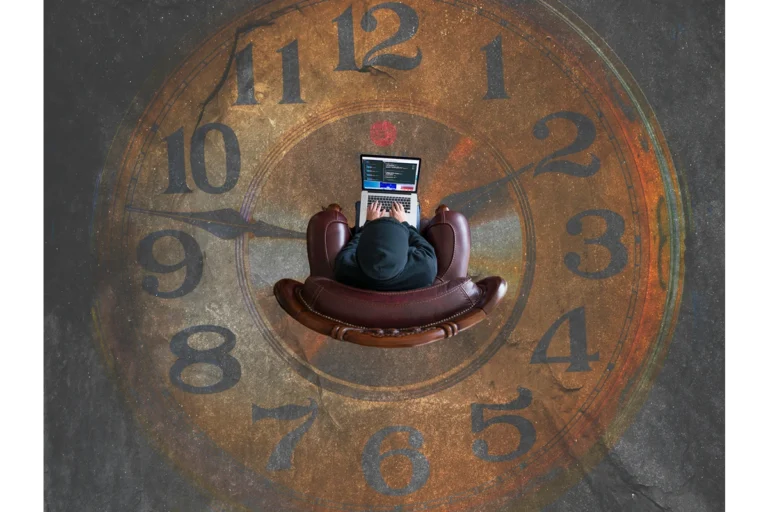Overview of Time Blindness & ADHD
- Time management difficulties disproportionately impact individuals with ADHD
- Why? It shows up more as time blindness, the inability to judge how long something will take, and difficulty tracking the passage of time.
- Difficulties with time perception also impact other areas of executive functioning and life.
- The ADHD brain tends to focus on the immediate stimulation; it’s difficult to conceptualize delayed rewards or consequences
- Addressing or implementing strategies for time perception is not linear; it requires a multifaceted approach combining cognitive, behavioural, psychological-emotional therapeutic strategies and environmental systems.
Always Losing Track of Time?
Imagine having no internal sense of time – confusion over how long tasks take, how to manage your time, or being so hyper-focused in an activity that you forget other responsibilities. This phenomenon is referred to as Time Blindness, and it is commonly associated with ADHD (Attention Deficit Hyperactivity Disorder). Pediatric behavioural health specialist Michael Manos recognizes that although losing track of time is a very human experience, “Some people with ADHD are more prone to having difficulty being able to judge how long something will take or to lose track of time” (Cleveland Clinic, 2023). Time blindness impacts more than just time management; it’s the inability to track the passage of time. It is connected to our routines, procrastination, planning and organizing, processing delays, decision-making, and maintaining concentration.
Stimulating Content
Our ADHD brains will underestimate delayed rewards and focus on immediate stimulation. Even when the intention is set, hours and minutes can still feel like seconds, and tasks waiting can be overlooked, especially when we are caught up in stimulating content.
What is stimulating content? I would define this as the way individuals with ADHD get dopamine: in content that is interesting or entertaining, new, challenging or competitive, and content that creates urgency. Media algorithms, video games, have intentionally removed all stop cues; there is nothing in our environment to gauge the passing of time, which essentially creates a trap for neurodivergent brains. Now it’s up to us to manually create those strategies or systems to reintroduce those cues for ourselves. However, that’s easier said than done.
Understanding Time Perception
In a study conducted by Mette (2023) to define reliable criteria for success in addressing time perception difficulties in ADHD, the results determined that time perception in ADHD has a very high complexity and variability. The study suggests that it is difficult to create a precise or consistent way to measure this because many overlapping factors, such as working memory, anxiety, and organizational skills, influence time perception in ADHD. These domains interact in complex ways, making it challenging to isolate and measure the true efficacy of any single intervention, or in other words, one solution to address our problems.
Finding the Right Strategy
A study by Kreider, Medina & Slamka (2019) explored how 52 college students with LD (Learning Disabilities)/ADHD used strategies to cope and perform productive tasks, found that strategy use for time-related and productivity challenges were “multidimensional and involved far more than managing their calendars… time-related and productivity strategies used to support performance across life’s contexts entailed a mix of cognitive, behavioral, psychological, and socio-environmental strategies”
If we break that down, we can understand that students rely on a broad set of strategies – cognitive (thinking processes), behavioural (actions and routines), psychological (emotional regulation and motivation), and socio-environmental (seeking support or structuring environments) – to combat time-related and productivity challenges.
Addressing Time Blindness
So what does this mean in terms of support? This means that addressing time blindness in individuals with ADHD combines multiple neuropsychological domains in understanding how time is experienced and managed, and therapy or coaching needs to address these interconnected factors together. A holistic approach might combine:
- Cognitive strategies – building working memory supports, reframing negative thought patterns.
- Behavioural strategies – using routines, reminders, and external time aids.
- Psychological support – addressing anxiety, self-esteem, and emotional regulation.
- Environmental supports – structuring surroundings, social accountability, and external scaffolding.
Final Thoughts
This perspective shifts therapy or coaching away from focusing only on linear productivity systems or calendar use and toward building a layered, individualized support system that integrates emotional, cognitive, and practical skills. Every person is unique in how they operate, understand and view themselves in relation to the world – so why would any approach be different?
References
- Cleveland Clinic. (2023). Why time flies when you’re having fun. https://health.clevelandclinic.org/time-blindness
- Kreider, C. M., Medina, S., & Slamka, M. R. (2019). Strategies for coping with time-related and productivity challenges of young people with learning disabilities and attention-deficit/hyperactivity disorder. Children, 6(2), 28. https://doi.org/10.3390/children6020028
- Mette, C. (2023). Time perception in adult ADHD: Findings from a decade—A review. International Journal of Environmental Research and Public Health, 20(4), 3098. https://doi.org/10.3390/ijerph20043098




